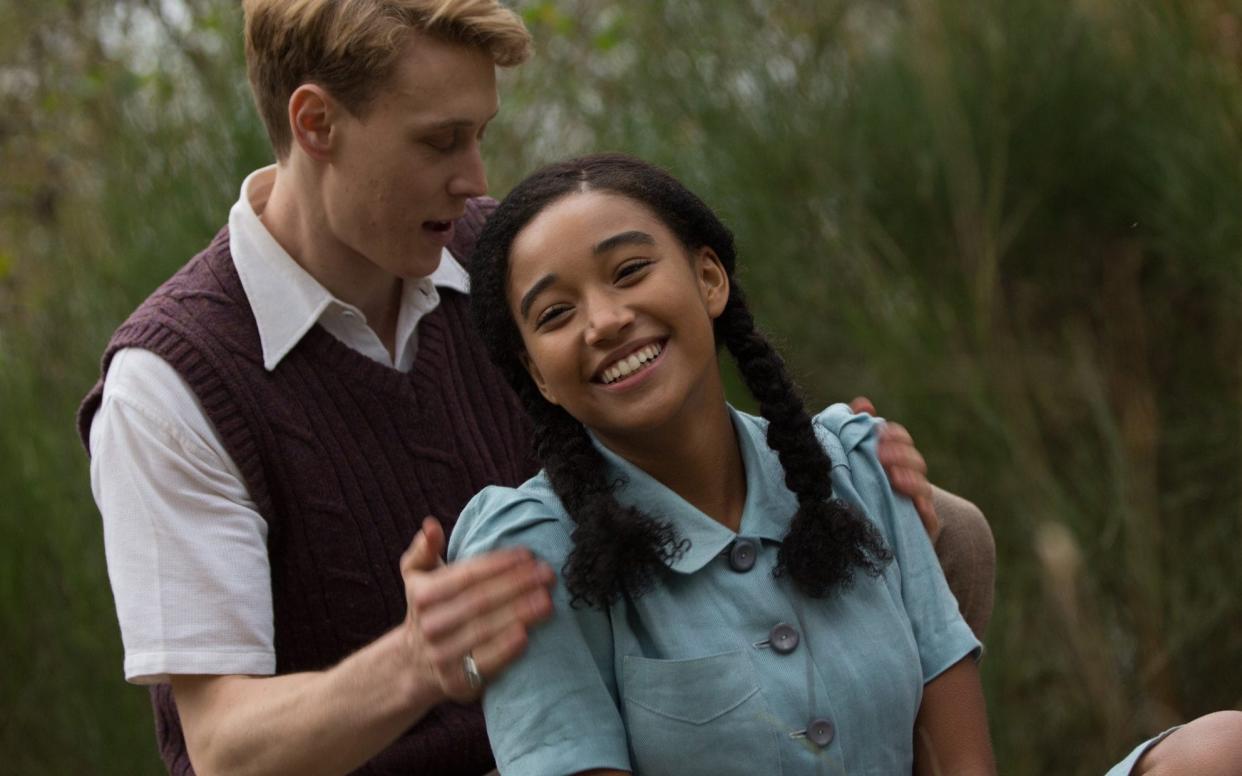Where Hands Touch review: a sleeve-tugging, tragically anodyne spin on history

Dir: Amma Asante. Cast: Amandla Stenberg, George MacKay, Abbie Cornish, Christopher Eccleston, Simon Harrison, Tom Goodman-Hill, Tom Sweet. 12A cert, 122 mins
Where Hands Touch is riskily fictitious for a star-crossed romance set against the backdrop of Nazi ethnic policy, and here its problems begin. Under the Third Reich, thousands of biracial Germans faced discrimination and deportation – a statistic unveiled in the end credits of Amma Asante’s film, a long-harboured passion project she put on hold while gathering the industry clout to make it.
What’s hard to believe is the particular story of 15-year-old Leyna (Amandla Stenberg), the daughter of a white German mother (Abbie Cornish) and an African father who isn’t in the picture. In 1944 Berlin, Leyna falls head over heels for Lutz (George MacKay), one of the more sensitive members of the Hitler Youth, whose own father (Christopher Eccleston) is a high-ranking SS commandant.
The casting of Stenberg – star of last year’s potent, young adult police drama The Hate U Give – is a telling clue to the film’s positioning. With its 12A rating, lightly pushed by one furtive sex scene and a couple of summary executions in long shot, it plays awkwardly to the teen market, and can’t help but feel like a sanitised educational exercise, a sort of Cliffs Notes mash-up of Romeo and Juliet with Schindler’s List.
Stenberg’s warmth, so compelling in the right context, feels contemporary to the bone. Though she has worked hard on the German inflection all the actors give to their lines, her performance stalls out somewhere in the middle: roughly around the point when Leyna gets brutally separated from both her mother and younger brother (Tom Sweet), and trucked out to a concentration camp.
There has already been time for Lutz, a nervous young recruit who has caught her eye repeatedly, to take Leyna secretly under his wing, even ushering her home for a spin of his favourite jazz records – a genre the film self-consciously dubs “n*gga music”, to the absolute disbelief of Black Twitter.
This is the first time Asante has worked from a self-penned script since her 2004 debut A Way of Life. It’s also her third feature in a row to prominently feature an interracial relationship, following 2013’s Georgian period drama Belle and 2016’s A United Kingdom, which paired David Oyelowo and Rosamund Pike as the king of future Botswana and his British wife. The point, unmissable to the point of heavy-handed in both those cases, is obscure this time: the portrait of Lutz comes close to #NotAllNazis special pleading, thanks to MacKay’s emotionally tortured, moonily sympathetic portrayal.

If anything, Lutz comes over as quite a lot more woke than Leyna, who views the persecution of Jewish characters in the film with an indifference bordering on the immoral: there’s even a scene where she points and shouts at a fleeing prisoner to provide distraction for her own attempted escape. If Asante’s idea is that Nazi ideology poisoned bright young minds into viewing their fellow citizens as less than human, the lovey-dovey bond she’s pushing as the main event seems even more implausible.
After an iffy run of late, Cornish regains some credit as a clenched hausfrau overcome with foreboding, even if she has to contend with curiously bleached eyebrows and a placeholder of a role that Asante hasn’t rendered fully enough. She’s spared the camp scenes, at least, and would that we all were: they pan out like a thoroughly YA dystopian vision, puzzlingly underpopulated by anyone who matters, and with staging to match.
Extras step aside so that Leyna and Lutz can reunite and gaze pleadingly at each other, craving mutual salvation on the other side of the compound from the dark smoke billowing out of chimneys. The film has no real vision and a crippling lack of memorable images: that ultra-vague title, which could mean almost anything, has translated into a sleeve-tugging, tragically anodyne spin on history.

 Yahoo News
Yahoo News 